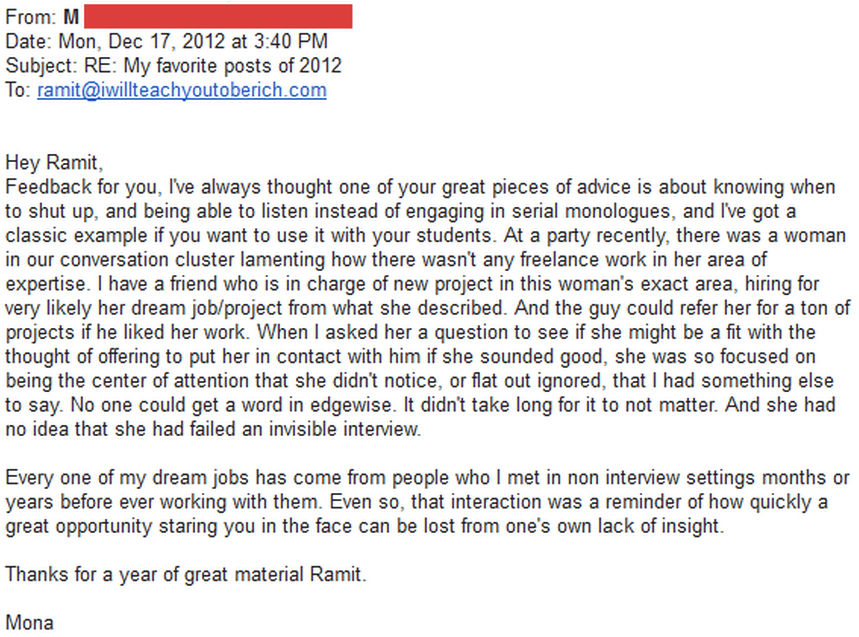How to Make Small Talk (and other advanced social skills)


Does any of this sound familiar?
- "I hate small talk, let's just get to the point?"
- "We started small talk and then there was this long awkward pause?"
- "I had no idea how to start the conversation so I just sat there silently"
Small talk. Ugh.
But, I do have good news: Small talk is a skill. And just like any other skill, you can become more natural at it with practice. Thousands of my students have improved their social skills (especially if they weren't "naturals" in social situations).
Today, I'm going to give you word-for-word scripts to help you start this process. Eventually, you'll be able to set these scripts aside and make them your own, letting your own personality shine through.
How to Make Small Talk at a Glance
- Instant Irresistibility: Why Small Talk is Important
- 3 openers that work in 90% of situations
- How to practice making small talk: low stakes experiments
- The invisible costs of poor social skills
- My "Small Talk" Hacks Video
- What to do TODAY
Instant Irresistibility: Why Making Small Talk is Important
Why even master small talk? Wouldn't it be easier to get straight to the important part of the conversation?
Let me tell you a story about my friend who's an actress. We were talking about how she'd gone on a bunch of dates and the guys always fell in love with her. They had an instant rapport with her and felt the connection was incredibly deep after meeting her for an hour.
What they failed to understand was that she's so socially skilled, she's able to evoke this feeling of awe in most people she interacts with. She's being totally transparent and ethical, but her social skills are so advanced that they bring out the best version of herself -- making her almost irresistible.
The first step to reaching this level of social skills is to master a fool-proof conversation opener.
The 3 openers that work for 90% of situations
Here are 3 scripts that work in nearly any situation. I'm giving you the exact words.
- "Hi. How's your morning going?"
- "Hi. I don't think we've met. I'm Ramit."
- "Good morning. How are you?"
Seems too simple?
That's intentional! Notice how ordinary they are. The truth is, we're not searching for magic words. We're simply looking for a way to connect and build rapport.
It's easy to 'nod and shrug?' and then go back to what you've always done (which probably doesn't include comfortably talking to anyone you'd like to talk to).
Or you can try something new. Use these scripts starting today and see how they evoke positive responses in others around you.
How many times have we walked past doormen, bartenders, people on the street, baristas and used our phones to avoid small talk?
We can change that starting today. Just a small baby step, say hello! Use just one of these openers to start a conversation with a stranger today.
How to Practice Small Talk: Low Stakes Experiments
The general openers above are great 'easy out" when you're struggling to think of something to say.
But the hardest part isn't having something to say. It's having the confidence to actually do it. One of the best ways to build that confidence is to start very short conversations in low-stakes environments.
I'll show you what I mean. Here are a few scripts to help practice your small talk skills with baristas and clerks.
Scenario #1: Servers and Baristas
Servers and baristas are paid to be friendly, so this is a low-stakes situation. Just be aware of your environment: For example, don?t make your first small-talk attempt when there's a line of 50 people behind you.
They'll ask how you're doing, and what you'd like to order. Instead of ordering your 'regular' (in my case, a tall iced green tea, unsweetened), smile first, then try this instead:
"What's good? (Everything!) ?No really, what do you get when no one's looking?"
Non-offensive, safe-for-work jokes can add value too, but test your delivery before trying it:
"Have you ever purposely misspelled someone's name on the cup because you didn't like them?"
"Seriously, what's the craziest order you've gotten this week?" (Notice how 'this week' helps them narrow down the question so they can answer it easily. You do not want to be asking deep philosophical questions at this stage of the game!)
Smile and keep the tone light. This is fun! Treat it like a game and watch what happens.
Scenario #2: Checkout Clerks
Most checkout clerks are treated like cogs in the machine. By taking a few extra seconds to make a genuine connection, you?re automatically standing out because the bar is set so low.
"Do you get a discount as an employee?"
[Pick up a tabloid] "I don't think I've ever seen anyone buy one of these. Do you sell a lot?"
Try one or create your own questions based around it. Remember to listen to their response, smile, and keep moving on.
The point here is that easy micro-tests in low-stakes environments like coffee shops and stores give you valuable practice and confidence you can apply to higher-pressure situations like conferences or bars.
The world wants you to be vanilla...
…but you don’t have to take the same path as everyone else. How would it look if you designed a Rich Life on your own terms? Take our quiz and find out:
The invisible costs of poor social skills
But what happens if your social skills are just average?
Sometimes, it seems the people who don't recognize the importance of social skills are the people who need it MOST:

She'll never know what she missed.
How many of us go through this every day? The scary thing is, we'll never know what we missed out on because of poor social skills. Those opportunities simply cease to exist.
For example...
- We don't talk to that girl at the bar, then kick ourselves later. Add this up over years and we end up getting our "second pick" of partners -- not the ones we WANT, but the ones who are convenient or left over.
- We stagnate in making new friends, since it's hard to meet real friends after college. Especially if you're not going out a lot.
- We might be technically very skilled, but we bomb the interview, or get passed over for a promotion, or we're not in the "inner circle" of people at work whom the boss favors.
There are even more haunting examples of the consequences of having mediocre social skills:
- I have friends who thought earning enough would be enough to attract a partner. They've spent the last 5-10 years on their career, but never took the time to learn how to talk to men and women on a personal level. (A lot of Indian people are like this, actually.) Now what? They?ve got great jobs and lots of money in the bank, but they're missing a core skill -- and as a result, the pool of potential high-caliber partners is way smaller than for someone else.
- One of my friends runs a successful tech company and was considering acquiring a small 1-man company. After a night of drinking, he asked me what I thought of the guy. He's a good friend so I told him the brutal truth: I told him that the guy was way too cocky for his experience, I wouldn't want him on my team, and I told him exactly why. My friend canceled the acquisition the next day. That guy will never know that his social skills cost him a 7-figure payday.
What do all these missed opportunities add up to over 10 years? 30 years?
If you learned even ONE technique to improve your social skills -- something you can use every day while talking to co-workers, men, women, even random people on the street -- what would that be worth?
FAQs about Small Talk and Social Skills
How can I make small talk in a virtual or remote setting, such as during a video call or online meeting?
To make small talk in a virtual or remote setting, start with a greeting, acknowledge the virtual setting, and ask open-ended questions to encourage the other person to share more about themselves. Use active listening skills, find common ground, and share something about yourself to help build rapport with the other person. End the conversation gracefully by thanking the other person for their time and expressing that you enjoyed the conversation.
How can I adapt my communication style to different situations, such as speaking with colleagues, clients, or supervisors?
To adapt your communication style to different situations, pay attention to the social cues and expectations of the people you're speaking with. Use formal language and industry-specific jargon when speaking with clients and supervisors, and use more casual language and humor when speaking with colleagues. Adjust your tone and body language to match the situation and try to understand the other person's communication style to better connect with them.
If you liked this post, you’d LOVE my Ultimate Guide to Social Skills
It’s one of the best things I've published, and totally free – just tell me where to send it: